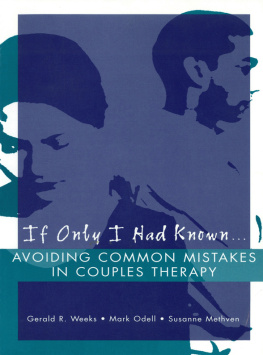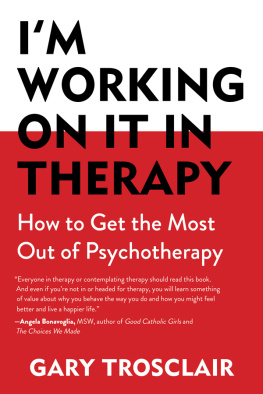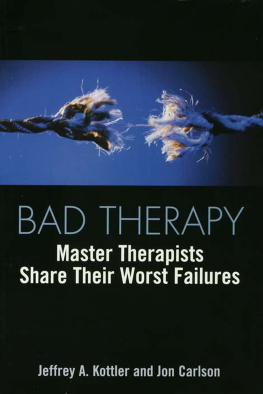Also by Gerald Weeks
Treating Infidelity: Therapeutic Dilemmas and Effective
Strategies, with Nancy Gambescia and Robert Jenkins
Erectile Dysfunction: Integrating Couple Therapy, Sex
Therapy, and Medical Treatment, with Nancy Gambescia
Hypoactive Sexual Desire: Integrating Sex and Couple
Therapy, with Nancy Gambescia

GERALD R. WEEKS, PhD., ABPP, ABS, is a professor at the University of Nevada, Las Vegas. He has published sixteen professional books in the fields of psychotherapy, couples, sex, and family therapy.

SUSANNE METHVEN has an MS in Counseling from the University of Nevada, Las Vegas and is pursuing a Masters of Divinity at the Episcopal Theological Seminary of the Southwest in Austin, Texas.

MARK ODELL, Ph.D., is owner and director of GlacierHaven, a counseling and consulting practice in northwest Montana designed for leaders and leadership development. He spent ten years in academia as a trainer of therapists and has published in a variety of areas.
Family therapy pioneer Carl Whitaker maintained that the therapist must win what he called the battle for structure (Whitaker & Keith, 1981). Winning this battle means taking control of the process and content of therapy. This does not mean that the therapist unilaterally sets the agenda but rather that he or she takes the lead with the couple in setting an agenda, implementing treatment, and working thematically or staying focused on the issue unless there is good reason to depart from the agenda.
Becoming adept at winning the battle for structure with couples is a skill many therapists never master, and, after too many frustrating failures, some end up avoiding couple therapy altogether. We cannot overstate how different couple therapy is from individual therapy and, to a lesser degree, from family therapy. For therapy to have the best chance to succeed the therapist must be in charge of how it proceeds, including setting and enforcing rules and determining who attends and how the participants will conduct themselves in session.
Therapists may lose the battle for structure if they:
Fail to decide who the client isindividual or couple
Fail to recognize that structuring the therapeutic relationship starts from the first client contact
Fail to establish and enforce ground rules for couples
Unintentionally unbalance therapy
Search for the objective truth with regard to the couples story
Fail to address their own issues about authority and confronting clients
The specifics of winning the battle for structure vary from client to client, but the therapist must win it in each case. If the therapist loses the battle for structure, the couple will replay the same dynamics in session that they enact at home. Many couples will notice this quite quickly, and some will comment on it. Others will give the therapist the benefit of the doubt, attributing his or her relative inaction to the legitimate need to gather data on their behavior. When the clients express distress that their therapy experience is no different than their regular everyday experience, the therapist has failed to make structural or process changes that will support relational change.
Failing to win the battle for structure can also lead to unbalanced therapy. When therapy becomes unbalanced, one partner essentially blames the other for their problem. Part of winning the battle for structure is balancing the system by helping each partner to see their contribution to the problem. Balancing the system gives partners a systemic or holistic way of viewing the problem.
Winning the battle for structure positions the therapist to effect change with motivated, cooperative clients who are working with a shared sense of goals. The implicit message to the couple is that the therapist is sufficiently competent to handle their situation, and, if they are willing to entrust themselves to him or her, a good outcome is likely. Winning the couples trust sometimes can take longer or be more difficult than one might think, but it is also something that can be explicitly discussed, even as part of winning the battle for structure. From time to time in our clinical work, we have had conversations that gently confront clients with what they believe our agenda as a therapist is. If they explicate something inaccurate that marginalizes the other partner (e.g., I want you to make Joe realize that he has to start listening to me) we secure a better sense of trust by reassuring them that we want them to have a relationship that they both find valuable. Both partners must win, or both lose.
Why Couples Present a Challenge to Structure
Couples are the most difficult of all client systems to control. With individual clients, the therapist is usually able to make fairly straightforward alliances, even though there may be challenges dealing with the clients old patterns and pathology. The vast majority of individual clients are able to work within a therapeutic relationship in which the therapist empathizes with, is supportive of, and confronts the client directly as needed. Family counseling can consist of a variety of member constellations, but the usual focus is parents coming to treatment to help their children. Parents overtly put aside their dyadic differences to cooperate and learn the necessary skills and practices to change their family. If they cannot do this, the therapist addresses their lack of consensus in parenting, consistent with a structural approach to family treatment. Such family work often moves to couple therapy.
By contrast, couples form stable and sometimes dysfunctional systems, with each partner often consciously or unconsciously blaming the other for his or her or their problems. The couple often presents as if they both have sought treatment to change, and, in fact, they may be genuinely committed to doing so. However, even if they arent aware of it, partners may have an underlying agenda to get the therapist to take sides and change the other person. Generally, members of couples find it easier to see their partners contributions to their difficulties than they do their own. Therefore, the therapist sometimes walks a very fine line between having a solid alliance with each individual and, for therapeutic reasons, maintaining the option of taking one partners side from time to time. Maintaining balance can be very difficult, especially in the face of one partners hyperemotionality or even emotional volatility by both partners. The couple may form a complementary behavior pattern, with one partner being emotional and the other rational. The therapist may unintentionally unbalance the couple system because of countertransference reactions.
The following dialogue shows the therapist struggling to gain control with a hyperemotional couple:
Wife: (crying) I have tried for years but he never listens to me about anything. He secludes himself and wont let me in.
Husband: (angry) For the record, thats just not true. I listen to you, but when you boss me around, and thats just about all the time, I tune you out and need my space.
Therapist: How can I help each of you get what you need?
Husband: (angry) Make her stop crying and bossing me around.









